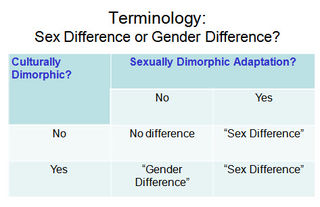Sex
Sex Difference vs. Gender Difference? Oh, I'm So Confused
A "sex difference" is a sexually dimorphic psychological adaptation.
Updated June 17, 2024 Reviewed by Lybi Ma
Is it a sex difference or a gender difference?
According to the Publication Manual of the American Psychological Association, "Gender is cultural and is the term to use when referring to women and men as social groups. Sex is biological; use it when the biological distinction is predominant." And according to the World Health Organization, "Sex refers to the biological and physiological characteristics that define men and women. Gender refers to the socially constructed roles, behaviours, activities, and attributes that a given society considers appropriate for men and women."
Neat.
So a gender difference is due to nurture, and a sex difference is due to nature. Well, not really so neat after all. Let me argue that both of these august organizations are deeply confused about gender differences. Umm, or did I mean sex differences? As I have suggested previously, nature vs. nurture is a deeply misleading and false distinction. And yet here are two highly influential organizations that have made the egregious error of making a false distinction that leads only to confused thinking.
Behavior is never either nature or nurture. It is always a complex interweaving of both.
When it comes to differences between men and women, a far more helpful question to ask is whether the difference derives from an evolved psychological adaptation, and if so, whether it is a sexually dimorphic psychological adaptation. For example, the propensity to engage in physical aggression is a sexually dimorphic psychological adaptation (M > F). Height is an example of a physical adaptation that is sexually dimorphic.
Granted, not all traits are psychological adaptations—some are byproducts of adaptations, and some are random variation. And not all psychological adaptations are sexually dimorphic. Some are sexually monomorphic (the same in men and women).
So, if we really want to better understand a difference between women and men, we need to first ask several questions:
Is the trait a manifestation of a psychological adaptation?
If so, is that adaptation sexually monomorphic or dimorphic?
Is the cultural socialization related to the trait monomorphic or dimorphic?
Using these distinctions we might be able to find a way past the "sex" vs. "gender" semantic minefield. For example, we need to know whether the underlying trait is sexually dimorphic and whether the cultural socialization is dimorphic. We can use these distinctions to help to define a "sex difference" and a "gender difference."

Using the distinctions in the table, the term "sex difference" refers to sexually dimorphic adaptations, regardless of whether cultural socialization is basically the same, or different, for males and females with respect to the trait.
The term "gender difference" would refer to those average group differences between men and women that are likely due to sexually monomorphic psychological adaptations combined with culturally dimorphic socialization. (Or, we may eventually find that they may be distant byproducts of sexually dimorphic adaptations.) For example, the tendency to wear trousers or dresses, cutting one's hair short or long, or wearing makeup are not likely to be directly due to sexually dimorphic psychological adaptations. We would expect gender differences to be more variable across time and cultures than sex differences.
Even with these new definitions, there is a fairly large gray area between sex differences and gender differences. Future research may untangle some of these distinctions, including "motherese" (the tendency of mothers to talk "baby talk" to their infants), childhood toy preferences, and occupational choice. For example, is the male preponderance in high-risk occupations such as race car driving due to greater male preferences to take physical risks—a psychological adaptation resulting from ancestral intra-sexual competition? Of course, there is no "gene for" becoming a firefighter or race car driver, but there are likely genetic differences between the sexes that predispose males to take more risks, and thus men may be more likely to prefer occupations in which these preferences can be expressed.
As time passes, I suspect that many "gender differences" will be found to actually be "sex differences," or at least distal byproducts of them. For example, I imagine that the dearth of cultures where women cut their hair short, while men let their hair grow long, is something more than just a random fluke of consistency in cultural socialization.
However, it is important to keep in mind that the definitions as presented in the table above are descriptive rather than prescriptive. That is, differences between the sexes are not presumed to be a moral good. Nor is it suggested that "sex differences" are immutable and uninfluenced by cultural socialization. Because behavior is always an interaction of nature and nurture, socialization can modify even significant sex differences—if we so choose.
Update, June 2024: I now think it would be a good idea simply to jettison the term "gender difference." It erroneously suggests that "nature" (sex) and "nurture" (gender) can be separate. Again, this is a false dichotomy -- all behavior is a very complex interweaving of both. The distinction should be whether the trait is sexually dimorphic or monomorphic (which still maintains that both nature and nurture always interact in complex ways).
References
Additional reading:
Beyond Nature vs. Nurture by Darlene Francis and Daniela Kaufer
This post on nature-nurture interactionism by PT blogger John Johnson.
The Agile Gene: How Nature Turns on Nurture, by Matt Ridley




